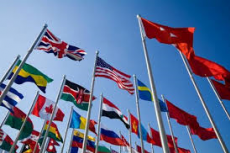
Email: ZYVC057@live.rhul.ac.uk
Total Article : 213
About Me:I'm a graduate student studying International Criminal Law and first started writing for King's News almost 4 years ago! My hobbies include reading, travelling and charity work. I cover many categories but my favourite articles to write are about mysteries of the ancient world, interesting places to visit, the Italian language and animals!

Welcome to a world of bloodthirsty wars, international organisations, global justice, peaceful treaties that can change the course of history as we know it and political figures so powerful that a single speech can dictate the start of an insurgence. This is not, as one may think, the banal bickering of party politics; this is the realm of International Relations.
International Relations is generally considered to be the study of relations between countries. There are around 196 countries in the world (195 if we exclude Taiwan which to some cannot be considered an official country) and 193 of these are part of an international global forum known as the United Nations. Let’s consider International Relations to be a game of chess in which each country carefully makes a move to secure its freedom, independence and prosperity. Sometimes these countries can create deep bonds of trust and form great alliances, such as relations between the USA and England, and other times these countries may enter into conflict. Conflicts are no longer confined to civil wars but are planned out on a larger scale causing concern for the international community.
The study of International Relations (abbreviated as IR) has been around since the Sumerian city-states all the way back in 3,500 BC according to some scholars but the interaction between sovereign states emerged after the Peace of Westphalia in 1648. The Westphalian treaties which put an end to both the Thirty Years’ War and the Eight Years’ War determined that a sovereign state is a non-physical entity with one centralised government which has the authority to preside over a determinate area and as such shouldn’t be invaded by outsiders.

International Relations is a highly interdisciplinary field (relatable to other subjects) involving politics, history, international law and economics and psychology as it attempts to understand the behaviour of states in foreign affairs. Here are a few of the mainstream theories in International Relations which present different views on how countries interact between each other:
REALISM: The world is a Hobbesian ‘war of all against all’ and countries constantly struggle for power. A state is primarily interested in its own safety and military power rather than international cooperation which is why realists believe no international organisation can every fully obtain global peace. Realism approaches can be offensive or defensive:
Offensive Realism: States are always worried that there isn't enough security so they will forever strive to maximise their power and influence; for example a state like the USA would never allow another state to become as powerful as it is and some use the offensive realism theory to explain the American intervention in the Middle East in 1991.
Defensive Realism: States do feel secure and learn their lessons from previous wars: they don't constantly strive for power anymore as they know expansion leads to conflict. State limit themselves to keeping the position of influence they already have.
LIBERALISM: The world is made of ties and bonds between countries, international organisations and global trade which makes it harder for a country to fight just for power as each sovereign state is tangled in a web of international interactions. International Organisations do exist and power is not only military, it can be economic or social too!
MARXISM: Marxism rejects both liberal and realist views and places the economic system as the core of its theory. The world is divided into economic classes and the rich capitalists have created the state system to ensure they can protect their power and wealth.
IMAGE 1:

0 Comment:
Be the first one to comment on this article.